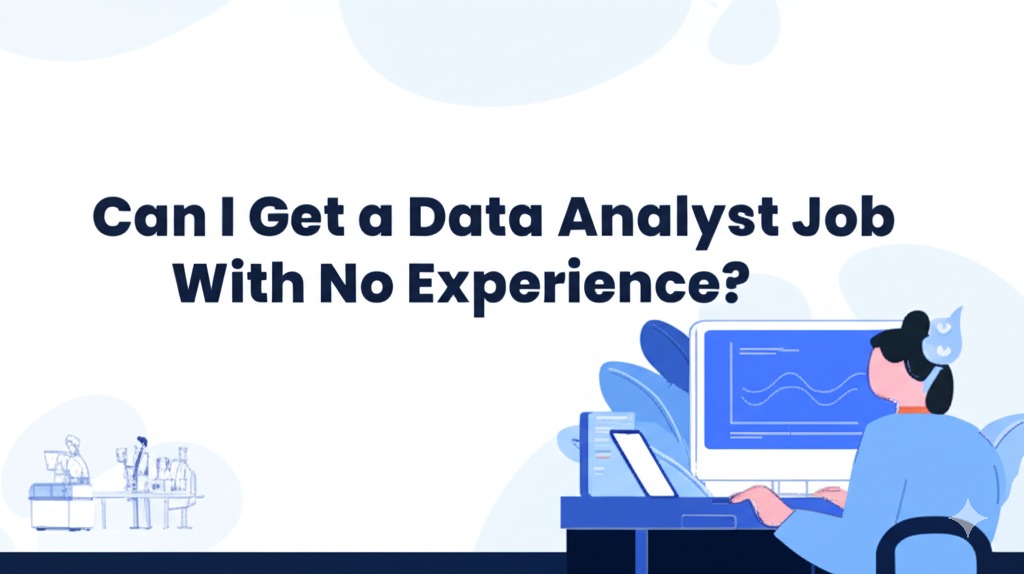
Breaking into data analytics might seem intimidating—especially with zero experience—but it’s absolutely possible. The tech world is rapidly evolving, and the demand for data-savvy professionals is growing by the day. So, if you’re wondering whether you can land a data analyst job without prior experience, the answer is a resounding yes—with the right approach.
In this article, we’ll explore how to overcome the experience gap, what skills you should focus on, and strategies to land your first data analyst role, even as a complete beginner.
What Does a Data Analyst Do?
Before diving into the “how,” it’s important to understand the “what.”
A data analyst is responsible for:
- Collecting, processing, and cleaning data
- Interpreting data trends to provide actionable insights
- Creating visualizations and reports for stakeholders
- Using tools like Excel, SQL, Python, R, and data visualization platforms such as Tableau or Power BI
With businesses increasingly relying on data to drive decisions, data analysts play a crucial role in nearly every industry—from healthcare and finance to marketing and sports.
Can You Really Get a Data Analyst Job With No Experience?
Yes, you can! Many data analysts begin their careers without formal experience in the role. What matters most is your ability to demonstrate knowledge, skills, and a passion for data. Here’s how you can make it happen.
How to Get a Data Analyst Job Without Experience
1. Start With the Right Skills
Even if you don’t have experience, you can build a strong skill set that employers value.
Key technical skills to learn:
- Microsoft Excel: Advanced functions, pivot tables, data cleaning
- SQL: Querying databases and data manipulation
- Python or R: For data analysis, statistical modeling, and automation
- Data Visualization: Tools like Tableau, Power BI, or Google Data Studio
- Statistics and critical thinking
You can learn these through online courses, YouTube tutorials, free coding platforms, or certifications from sites like Coursera, edX, and DataCamp.
2. Build a Portfolio of Real Projects
Employers want to see what you can do, not just what you know.
How to build a portfolio without job experience:
- Analyze public datasets (from Kaggle, government portals, etc.)
- Create dashboards or interactive reports
- Write case studies or blog posts explaining your process
- Upload your projects to GitHub or a personal website
Pro tip: Focus on projects that are aligned with your target industry (e.g., finance, healthcare, e-commerce) to show domain interest.
3. Leverage Free Internships, Freelancing & Volunteer Work
If you’re struggling to land a full-time job right away, start small:
- Offer to analyze data for local nonprofits or small businesses
- Take on freelance gigs through platforms like Upwork or Fiverr
- Apply for virtual internships (check Internshala, Forage, or LinkedIn)
These experiences not only build your resume but also teach you soft skills like communication and problem-solving.
4. Network Your Way In
Who you know can matter as much as what you know.
- Join data-related communities on LinkedIn, Reddit (like r/datascience), and Discord
- Attend webinars, local meetups, and hackathons
- Connect with data professionals and ask for informational interviews
Don’t be shy—many people are open to sharing advice or even referring you for junior roles.
5. Tailor Your Resume and LinkedIn Profile
Even with no formal job experience, you can still stand out with a skills-focused resume.
Tips:
- Highlight projects, certifications, and relevant coursework
- Use keywords from the job description (like “data cleaning,” “Python,” “dashboards”)
- Showcase transferable skills from other jobs—problem-solving, analytical thinking, attention to detail
Make sure your LinkedIn profile reflects your passion for data, includes your projects, and has a clear headline like “Aspiring Data Analyst | SQL, Python, Tableau | Open to Opportunities.”
6. Apply Strategically and Don’t Fear Rejection
Aim for entry-level or internship roles, and don’t worry if you don’t meet every requirement.
Look out for job titles like:
- Junior Data Analyst
- Data Analyst Intern
- Business Intelligence Analyst
- Operations or Marketing Analyst
Apply consistently, learn from rejections, and stay persistent.
What Recruiters Really Look For
Believe it or not, employers often care more about your ability to learn and adapt than about years of experience.
They look for:
- A portfolio that shows hands-on skills
- A growth mindset and willingness to learn
- Effective communication—can you explain your analysis clearly?
If you can show those three things, you’re already ahead of many candidates.
Final Thoughts: You Can Break Into Data Analytics Without Experience
While experience helps, it’s not a barrier to entry. With the right mix of skills, portfolio work, strategic networking, and persistence, you can absolutely land a data analyst job—even without a traditional background.

Andre Cuevas provides career insights, job search strategies, and professional advice to help individuals navigate the job market and achieve their career goals.





